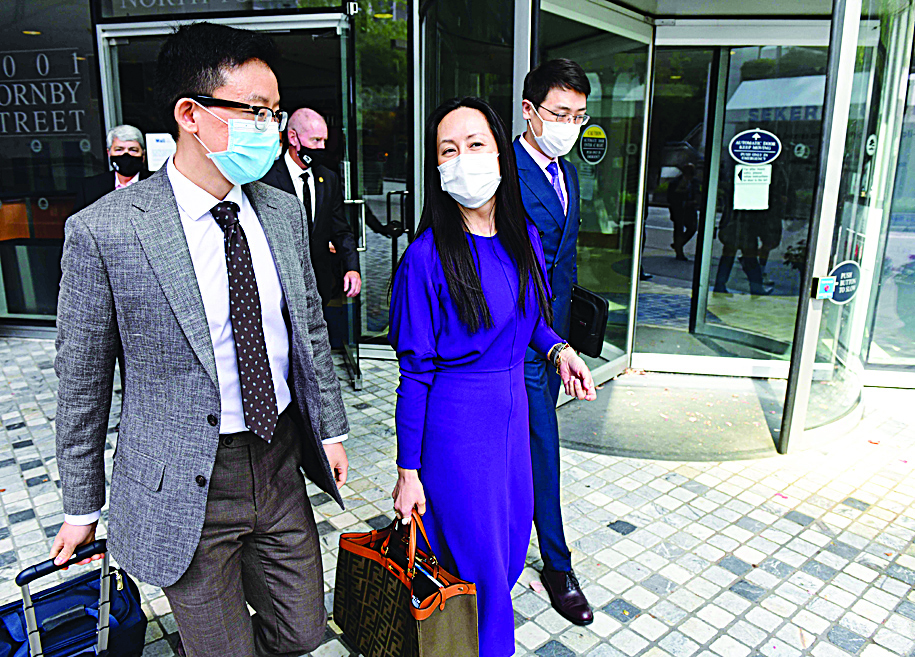VANCOUVER: Chinese Huawei executive Meng Wanzhou's fight in a Canadian court against extradition to the United States to face fraud and conspiracy charges wrapped up Wednesday after nearly 1,000 days of legal wranglings and diplomatic brawls. The daughter of company founder and CEO, Ren Zhengfei, is accused of defrauding HSBC Bank by falsely misrepresenting links between Huawei and Skycom, a subsidiary that sold telecoms equipment to Iran.
This, according to the US Justice Department, put the bank at risk of violating US sanctions against Tehran, as it continued to clear US dollar transactions for Huawei. Supreme Court of British Columbia Associate Chief Justice Heather Holmes said she will on October 21 likely set a date to deliver her ruling.
Meng, 49, is living in a Vancouver mansion on bail conditions that include a curfew and electronic monitoring, as she awaits the outcome of her extradition proceedings. If transferred to the United States for trial and subsequently convicted, Meng could face more than 30 years in a US prison. Yesterday, China's foreign ministry said Meng's case was "entirely political" and aimed to suppress Chinese enterprises. "We urge Canada to immediately correct its mistake, to release Meng Wanzhou and allow her to return home safely as soon as possible," said foreign ministry spokeswoman Hua Chunying.
Meng's arrest in December 2018 during a stopover in Vancouver caused a deep diplomatic rift between Ottawa and Beijing, which has accused Washington of trying to crush its international tech giant Huawei. Days later, China detained two Canadians, businessman Michael Spavor and former diplomat Michael Kovrig, in what Western nations have decried as "hostage diplomacy." Both were tried in March for espionage-charges that Canadian Prime Minister Justin Trudeau has said were "trumped up." Last week Spavor was sentenced to 11 years in prison as the final arguments in Meng's case got underway.
'Fraud law on its head'
In a hearing last week, Meng's lawyers rejected the US allegations against her, accused Canadian and US officials of abuse of process and called for her release. Defense lawyer Mark Sandler argued this week there was no deceit and no loss or risk of loss to HSBC, telling the court: "We have turned fraud law on its head in this proceeding."
Canadian government lawyers representing US interests in the hearing countered that the defense's arguments were best aired at a trial, and that the judge should commit Meng for extradition. To do so, Associate Chief Justice Holmes only needs to find that there is sufficient evidence to go to trial-a relatively low bar. "No one has received a fairer extradition hearing in this country than Ms. Meng," Crown Attorney Robert Frater insisted Wednesday. Both Canadian and US authorities, meanwhile, have denied any abuse of process in the case.
Tea house evidence
Key to the US case is a PowerPoint presentation Meng made to HSBC executives in a meeting at a Hong Kong tea house in 2013 intended to reassure them that Huawei was not engaged in activities that could cause HSBC to run afoul of US sanctions law, following reports to the contrary. Frater said Meng's presentation was "blatantly misleading" for not disclosing the true nature of the relationship between Huawei and Skycom, calling their business relationship "controllable" but obscuring that the two companies are one and the same.
"You should have no difficulty finding dishonesty sufficient to make a prima facie case of fraud," he told the extradition judge. Beijing-Ottawa relations have hit rock bottom over the case and those of the Canadians held in China. Trudeau denounced Spavor's sentence as "unacceptable and unjust," with China's foreign ministry responding by calling the Canadian premier "arrogant" and "ridiculous." Kovrig is still awaiting a sentence, but no date has been announced. - AFP



